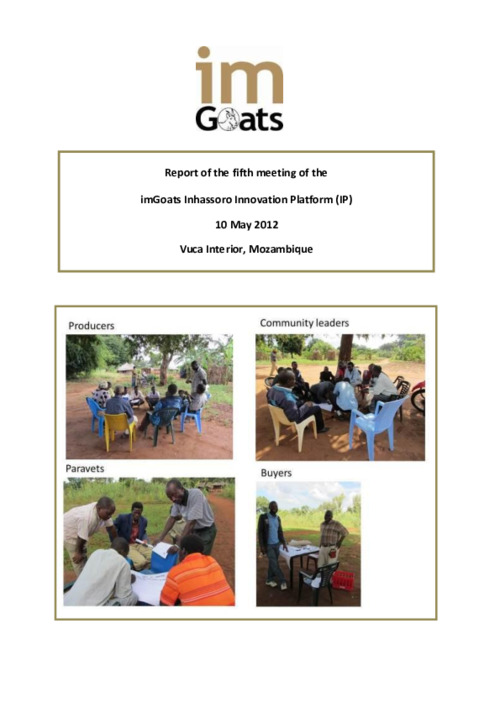Report of the fifth meeting of the imGoats Inhassoro innovation platform, Vuca Interior, Mozambique, 10 May 2012
Abstract
The goal of the “Small ruminant value chains as platforms for reducing poverty and increasing food security in dryland areas of India and Mozambique (imGoats)” project is to increase incomes and food security in a sustainable manner by enhancing pro-poor small ruminant value chains in India and Mozambique. The project proposes to transform goat production and marketing from the current ad hoc, risky, informal activity to a sound and profitable enterprise and model that taps into a growing market, largely controlled by and benefiting women and other disadvantaged and vulnerable groups; while preserving the natural resource base.
The specific objectives of the project are to:
(a) pilot sustainable and replicable organizational and technical models to strengthen goat value chains in India and Mozambique that increase incomes, reduce vulnerability and enhance welfare amongst marginalized groups, including women; and
(b) document, communicate and promote appropriate evidence-based model(s) for sustainable, pro-poor goat value chains.
In addition to goat keepers, beneficiaries will include other goat value chain actors, including small-scale traders, input and service providers. The project is following innovation systems approaches within a value chain framework. The value chain models will be implemented through the two mechanisms of innovation platforms and producer hubs, which will be comprised of multiple and diverse stakeholders. Innovation platforms (IPs) provide spaces for value chain actors to interact, communicate and act to improve performance of the value chain and with the resulting benefits to the actors. They will also be the mechanism to stimulate joint action to test feasible technical, organizational and institutional interventions for improving the productivity of goats, their marketing and associated service delivery.
Using an appropriate and focused Monitoring and Evaluation framework, the project will document the participatory approaches used, processes followed, outcomes generated and lessons learned to generate research evidence towards the development of goat value chain models that benefit the poor. Lessons learned and opportunities for scaling up and out will be communicated to policymakers and development practitioners.
The project is being implemented by CARE in Mozambique, while the overall leadership and co-ordination of the project is done by the International Livestock Research Institute (ILRI).
This report provides an account of the fifth meeting of the imGoats Innovation Platform (IP) held on 10th of May in Manusse, Inhassoro district of Mozambique, facilitated by CARE. To monitor innovation processes, it is important to capture the IP meetings as well as the process between the meetings. Activities in between the 4th and 5th IP meeting therefore have been discussed in the IP meeting (section 4) but one topic has been addressed in more detail in section 2: construction of the first improved kraal. Section 4 continues with the IP meeting process and includes the planning of activities for the coming two months and a group discussion on the benefits of the IP and the IP sustainability. The report is concluded with a few lessons learned for designing and facilitating future meetings (section 5)

